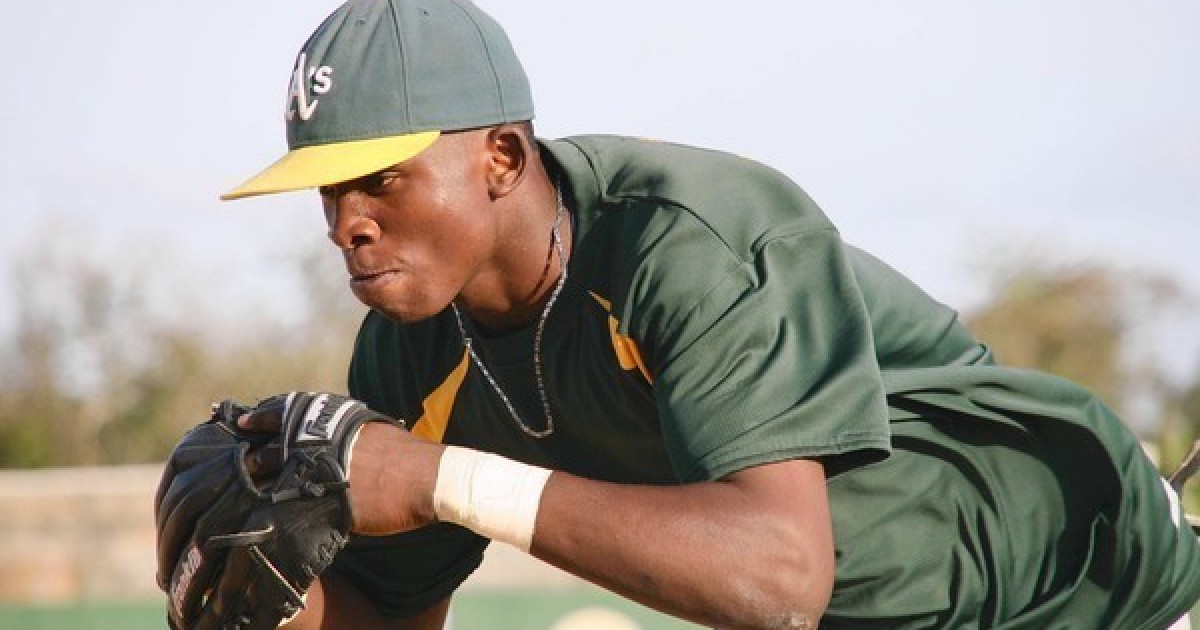By Chlotrudis Independent Film Society
Rating: 4 cats
Director: Jonathan Paley | Ross Finkel | Trevor Martin

Original language title: Pelotero
Country: dominican_republic, united_states
Year: 2012
Running time: 72
IMDB: http://www.imdb.com/title/tt1885335/
Jason says: “I’ve already seen and reviewed a couple of movies about Dominican ballplayers trying to make the American major leagues – one fairly lightweight documentary (RUMBO A LAS GRANDES LIGAS) and one feature (the excellent SUGAR) – so I nearly passed on this one until a festival director reminded me that my first choice would have a regular theatrical run soon enough and, you know, baseball! And I’m glad; PELOTERO (‘Ballplayer’) got lucky where its subjects are concerned, but the filmmakers still deserve credit for piecing it together so well.
“Jean Carlos Batista and Miguel Angel Sano were, when PELOTERO was filmed in 2009, two Dominican teenagers who play shortstop and practice with neighboring trainers. Jean Carlos works with Astin Jacobo and is a solid, hard-working prospect, while Miguel Angel works with ‘Moreno’ Tejada, and is such a cocky natural talent that he’s known as Bocaton (‘big mouth’) and widely expected to garner the highest signing bonus a Dominican player has ever received. That is, if Major League Baseball’s investigators can be convinced that he will only be celebrating his sixteenth birthday in the months leading up to the July 2nd signing day.
“This is not an idle concern; not only is Sano a big guy with an advanced skill set, but many Dominican prospects have been caught lying about their age or, when that became harder to do as the United States implemented more stringent immigration controls, assuming others’ identities. We are told that 20% of all professional baseball players come from the Dominican Republic despite the island having a population just 2% the size of that of the U.S., but even considering that, the vast majority of these teenagers will go unsigned; the difference between dropping out of school to concentrate on baseball full-time for nothing and receiving a life-changing bonus can be razor-thin. Even discounting the prospect of fraud, these kids and everyone around them are highly motivated.
“Their focus is in many ways their defining characteristic, although directors Ross Finkel, Trevor Martin & Jonathan Paley and editors Mary Manhardt & Isaac Solotaroff are able to select footage that does a good job of building everybody involved up as individuals. That’s important, because PELOTERO’s story winds up being very much character-based as opposed to simply informative, and the audience needs to know both what sorts of archetypes the players are representing as well as how their respective personalities affect the unfolding story. They do that pretty well; Batista and Sano are an interesting contrast even if Jacobo and Tejada, by necessity, come across as similar. Nobody gets an obvious villain cut.
“As much as the filmmakers were fortunate enough to find protagonists who fit nicely into a conventional narrative, they’ve got good material for other themes, too. It’s hard not to do a story on this theme without making note of how baseball exploits Dominican kids – the contrast between everyday life in San Pedro de Macoris and how the players who made it big in the majors live (or even the house that a prospect who signs can buy for his family). Still, even when representatives of major league teams aren’t saying so directly, there’s a pervasive theme of how the teams see these teenagers as commodities and have rigged the system in their favor. The parallel narratives in the second half are interesting examples of people on both sides trying to game the system, even though hard evidence of dishonest dealing is hard to find. Interestingly, the buscones like Jacobo and Tejada come off fairly well here, though many news stories have tended to paint them as corrupt enablers trying to scam MLB teams.
“Parts of PELOTERO are somewhat out of date now, as the new collective bargaining agreement between the league and players’ association is likely to drastically reduce money paid to international free agents like Dominican players, changing the calculus a little. Even with that being the case, though, the underlying issues are just as compelling and the personal moments, like the last scenes with Astin Jacobo and the teenager who thinks of him as a surrogate father, will continue to make for good drama. 4 cats
“Seen 26 April 2012 in Somerville Theatre #4 (Independent Film Festival Boston 2012, digital)”
